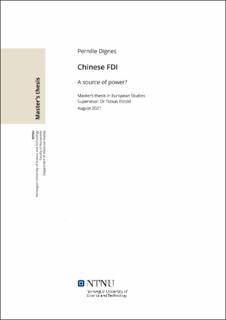| dc.description.abstract | The aim for this thesis was to explore the topic of Chinese FDI. Chinese FDI has become a topic in the EU, and there have been some concern raised by the EU and its member states. The thesis explores if it’s possible for the Chinese government to gain power through using FDI in European member states to yield power. It will further focus on the transport sector.
The analytical framework the thesis will base itself on are the theory of the international system by Kenneth Waltz. Also, the to explore channels that FDI can gain power in, the thesis will use Joseph Nye´s theory about soft power.
Using Waltz and Nye´s theories about power the thesis will conduct an analysis upon the topic of Chinese FDI in Europe. The analysis will explore the possible security threats for the EU and also analyze how the new trade agreement will affect the distribution of power in the system.
To answer the research question, the thesis uses two case studies. The case study states are Finland and Greece. Both nations have projects regarding expansion of their transport sector and want to attract FDI.
With concluding the analysis, the thesis found that the Chinese government was using FDI as a tool in member state to yield power. The analysis found that on a EU level, the distribution of power was the most important factor. While on the member state level, soft power and public diplomacy in regarding the use of FDI was the most important factor, for the Chinese government to yield power. | |
